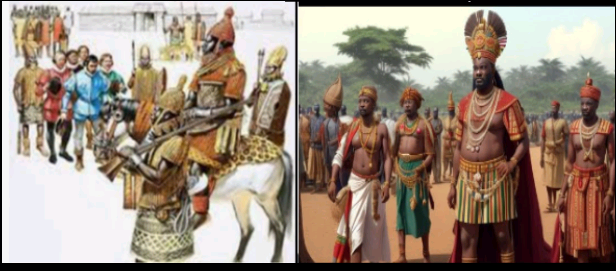Among the league of nations with a complex, multicultural makeup and diversity is Nigeria. This is one country continually shaped by the consequential co-habitation of several distinct ethnic groups with strong identities. Over the centuries, these tribal neighbours have influenced each another’s histories in significant ways, even before the age of colonization. And they continue to do so. There is hope that the ancient kingdoms of Nigeria, with their manifold wisdom and experiences over time, will teach us valuable lessons. And that those lessons will help to foster greater unity in times to come.
We implore our readers to join us as we explore the richness and diversity of the ancient kingdoms of Nigeria up until British colonization. Thousands of years of evolution, migration, native wisdom, technology, heritage, legends, wars, cohabitation, and eventual exposure to the Western world is definitely worth studying. Happy reading.
Before the Ancient Kingdoms of Nigeria: Prehistoric Times
Some of the oldest-known human civilizations have been traced to regions within or close to Nigeria – within the West Africa region. Archaeological findings suggest that prehistoric humans using Acheulean tools have existed in West Africa from at least between 780,000 and 126,000 years before now. Middle Stone Age West African inhabitants probably began to migrate south of the West Sudan savanna around 61,000 years ago. And by at least 25,000 ago, they may have moved close to the coast of West Africa.
And between 20,000 and 12,000 years ago, the West African landscape became more humid. Similarly, the forest regions grew bigger; and more hunter-gatherers of the Late Stone Age West Africa settled in the area. Notable members of this era were the people of Iwo Eleru in Nigeria. These hunter-gatherers were in existence till around 1500 AD, when they eventually intermixed with West African agricultural communities.
The Nok culture is the most recent of these ancient cultures, whose origins was traced to sometime around 1500 BC. The terracotta, bronze, and iron sculpture traditions of the Nok people are thought to be inherited by later kingdoms such as the Igbo-Ukwu (Nri), Bini, and Ile-Ife. Following the existence (and passing) of the Nok culture, several ancient kingdoms came forth. They include:
- Bini Empire
- Oyo Empire
- Ile-Ife Kingdom
- Kingdom of Nri
- Borno Empire
- Hausa City-states
- Songhai Empire
- Borgu Kingdom
- Kebbi Kingdom
- Kwararafa Kingdom
- Ibibio Kingdom
- Yagba East Kingdom
- Nupe Kingdom and
- Warri Kingdom
The Gradual Settlement and Cohabitation of the Ancient Kingdoms of Nigeria
The 11th Century witnessed the arrival of Islam, introduced by the Borno Empire into northern Nigeria. Islamic clerics promoted the worship of only Allah (monotheism); and introduced new and more structured political and educational systems.
Sometime after 1804, the Fulani islamic cleric Usman Dan Fodio embarked on a jihad (holy war). The war was spurred by harsh tributes imposed by the ruling Hausa elite on settlers at that time. Worse still, the Hausa states were in disarray, fighting amongst themselves. Thus, Usman Dan Fodio succeeded in uniting the entire Hausaland, and established the Caliphate of Sokoto.
It is also noteworthy that the largest known slave population in the world were actually owned by the Sokoto Caliphate. In the 1890s, they were an estimated two million slaves. They were used for large-scale activities (such as agriculture), and sold to Arabs during the famous trans-Saharan trade era.
While in the 15th Century, Christianity was introduced into Nigeria by Portuguese monks who passed through the Niger Delta (Warri) in southern Nigeria. More Christian missionaries arrived via the same route; and they established churches and schools which further helped to spread the faith. Trading and seafaring ports also emerged along the coastal regions of southern Nigeria – notably Calabar, Badagry and Bonny. These ports thrived in all kinds of trade, including the exchange of slaves (the transatlantic slave trade). Slaves were not in short supply, due to the capture and selling-off of enemy tribesmen during the inter-tribal wars of that time. It included several captives from kingdoms such as Oyo, Ijebu, and Dahomey.
The transatlantic slave trade was eventually abolished; but the trade ports persisted, and became the big seaports that they are today. Yet again, the British government gained access and control of the entire northern and southern Nigeria in stages, by passing though these trading ports.
Strong Merits of Some Ancient Kingdoms of Nigeria
In conclusion, we make mention of some strong merits of certain ancient kingdoms of Nigeria. These kingdoms exhibited social and political systems that can teach us valuable lessons in modern-day Nigerian society.
For instance, the Bini empire of the Niger Delta was renowned for its highly-organized security, trade, and administration; as well as well-developed art and crafts industries. The Nri kingdom of Anambra state was notable for its centralized political system – which had strong religious impact on its people. And the Oyo empire exhibited military prowess (particularly with the help of its cavalry forces). With this in place, the Oyo empire was able to conquer and expand their territories for many decades.
